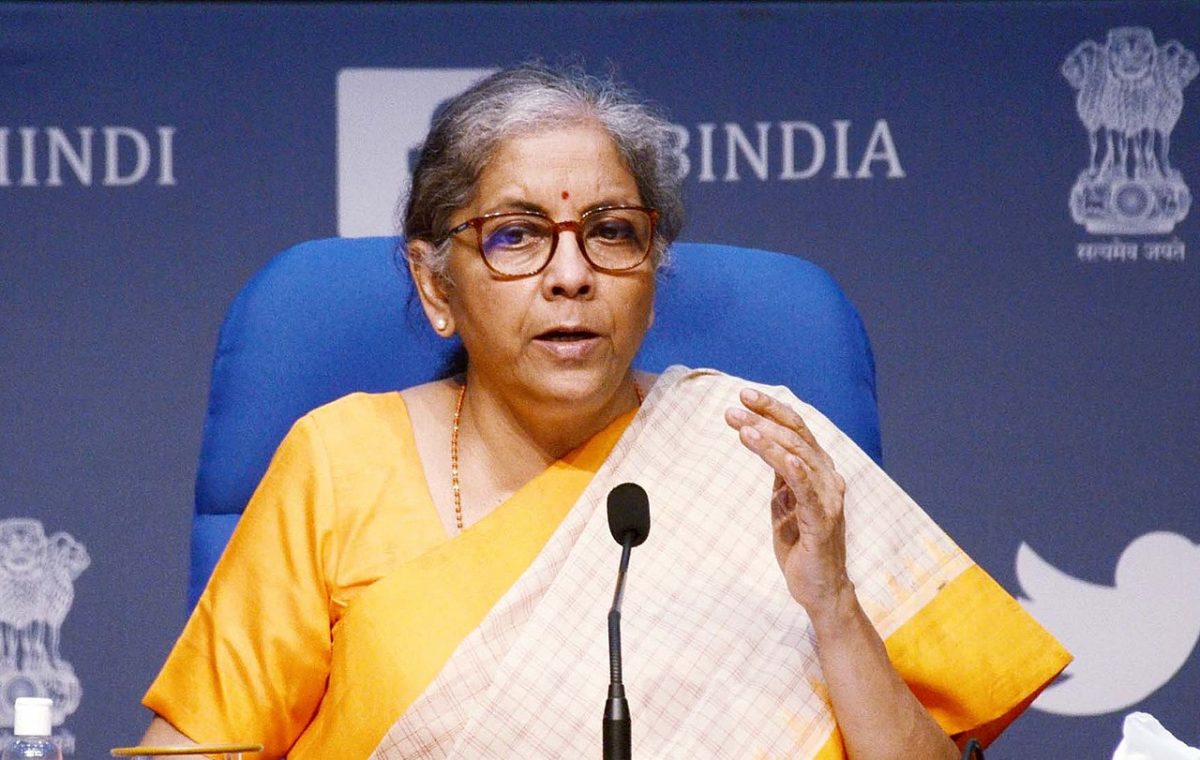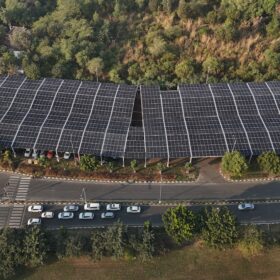The union budget has attempted to boost domestic manufacturing by raising import duties on finished products including PV inverters and solar lanterns.
Imported solar-project components and structures will also get more costly but the price of the raw materials they are made from, such as coated steel for mounting structures, will get a helping hand with a eight-month suspension of anti-dumping duties.
Presenting the 2021-22 budget, finance minister Nirmala Sitharaman said customs duties on solar inverters and lanterns, currently levied at 5%, would rise to 20% and 15%, respectively, with effect from February 2, to even the playing field for Indian manufacturers.
The dominance of imported inverters in the market was demonstrated by an estimate from analyst Bridge To India which suggested almost 80% of Indian rooftop solar installations added from July 2019 to the end of June featured Chinese products.
The anti-dumping duties levied on Chinese, Vietnamese and Korean flat rolled steel products which are plated or coated with aluminium or zinc alloy, will be suspended from today until September 30. Anti-dumping duty legislation stipulates such charges may be temporarily suspended for a maximum of 12 months and no reason was given by the government for opening a eight-month window, other than the desire to speed up solar project deployment.
Indian credit ratings agency Care Ratings has estimated mounting structures require 30 metric tons of aluminium and zinc-coated flat steel for each megawatt of project generation capacity.
While developers may benefit from a temporary fall in the cost of such solar project raw materials, the price of the sort of components they are made into is set to rise, at least for imports, with the budget withdrawing the basic customs duty exemption for all machinery including prime movers, instruments, appliances, components or auxiliary equipment, used in solar project construction.
No mention is made of the basic customs duty exemption afforded solar modules and cells, however, with the 2022 deadline for establishing 100 GW of solar nationwide getting ever nearer.
Sitharaman highlighted the government’s plan to incentivize higher-quality solar manufacturing, stating: “Solar energy has huge promise for India. To build up domestic capacity, we will notify a phased manufacturing plan for solar cells and solar panels.”
The finance minister also announced an INR3,05,984 crore, five-year fund to help financially crippled power distribution companies. The cash will be available for infrastructure projects such as the roll-out of pre-paid smart meters, feeder separation and system upgrades and will be tied to improved financial performance.
That handout was balanced, however, by the minister mooting plans to remove the monopoly position enjoyed by public and private power companies. A framework would be developed, said the minister, to offer electricity users a choice of power company.
There was a hit for energy storage, with lithium-ion battery parts – other than those used for cell or protection circuit board assembly – set to be subject to a customs duty of 2.5% from April.
Sitharaman also confirmed plans for a green hydrogen strategy, saying: “Prime minister [Narendra Modi], while speaking at the third Re-invest Conference, in November 2020, had announced plans to launch a comprehensive National Hydrogen Energy Mission. It is now proposed to launch a Hydrogen Energy Mission in 2021-22 for generating hydrogen from green power sources.”
And there were budget boosts of INR1,000 crore and INR1,500 crore for the Solar Energy Corporation of India (SECI) and Indian Renewable Energy Development Agency (IREDA), respectively.
Reaction
The budget earned praise from solar manufacturers and developers alike for the announcements about the increase in solar inverter import duties, capital increases for SECI and IREDA, the hydrogen energy mission, and power sector reforms.
However, PV manufacturers were disappointed at the lack of customs duty for imported solar modules and demanded more details on how the government’s plan to drive higher-value solar production would work.
Bharat Bhut, co-founder and director of module manufacturer Goldi Solar, welcomed the increase in duties on imported solar inverters and lanterns but said industry had been calling for duties on imported modules since the last budget was announced. The lack of customs duty, combined with the scheduled finish in July of the safeguarding charges applied on imports, would put Indian solar manufacturers at a huge disadvantage, said Bhut.
Referring to government solar manufacturing incentive scheme, he said: “A passing mention of an additional allocation under [the] PLI [phased linked-incentive] scheme was made. While there is still no clarity on what the scheme entails, we hope that this will open up some avenues for local players and the [solar manufacturing] ecosystem.”
Chiranjeev Saluja, MD of fellow solar cell and module manufacturer Premier Energies, sees the withdrawal of the customs duty exemption afforded to imported solar project machinery as a retrograde step. “If the exemption is indeed withdrawn, then it may drive up the equipment cost, which will act as a deterrent for new investments in the solar sector,” he said. “It will also drive up project execution cost, which will impact the bottom line of companies engaged in solar manufacturing.”
Gyanesh Chaudhary, managing director of Vikram Solar, said the Indian renewables industry, especially solar, appreciates the government of India’s efforts to help clean power, especially during the pandemic, but had been hoping for more nuanced support from the latest budget. Among the missed opportunities, the MD cited potential exemption of customs duties for manufacturers based in special economic zones; 5% interest subvention on term loan and working capital; upfront central financial assistance of 30% on capital expenditure; an increase in export incentives from 2% to 8% under the Remission of Duties or Taxes on Export Product; a ‘super deduction’ for R&D expenses and access to a national clean energy fund.
“As domestic solar manufacturers, we are appreciative of the government’s focus towards supporting solar manufacturing growth in India and hope the new phased manufacturing plan for solar cells and solar panels [continues] to embody the intent,” said Chaudhary.
This content is protected by copyright and may not be reused. If you want to cooperate with us and would like to reuse some of our content, please contact: editors@pv-magazine.com.









As per the notification, solar Inverter custom duty was applicable from 1st Feb only. Please check as you have mentioned it from April.
Thanks Ayush, the sentence has been modified to read the duties on inverters are applicable from February 2, as mentioned in the budget document.